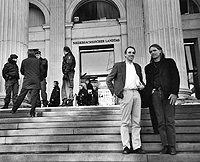 Last fall, forest activist Ingmar Lee (right) toured Europe talking about British Columbia forest problems. Here is a report from Germany of his tour, called WaldAktion British Columbia, or Forest Action British Columbia.
Last fall, forest activist Ingmar Lee (right) toured Europe talking about British Columbia forest problems. Here is a report from Germany of his tour, called WaldAktion British Columbia, or Forest Action British Columbia.
by Karen Wonders
It was gratifying to discover that in Germany, Denmark and Sweden, where Ingmar lectured, thereexists a broad-based public concern over the destruction of Canada’s forest heritage. No one can deny that during the colonial era Europe benefited enormously as a result of rampant exploitation of natural resources around the world. Yet Europeans today are increasingly demanding public accountability for the environmental consequences of industrial exploitation of “nature’s riches.” There was an encouragingly positive response to the plea by Ingmar to join the environmental battle to save what little remains of BC’s old-growth forests.
Whereas some BC politicians dismiss “radical tree-huggers” such as Ingmar, his uncompromising activism is admired over here. For many Europeans, the relentless clear-cutting of BC’s ancient temperate rainforests is indeed an international outrage. No amount of eco-friendly rhetoric from the corporations who profit from industrial logging can mitigate the tragedy of the nearly completed extermination of old-growth forests.
Support for the “WaldAktion British Columbia” was found among a broad variety of hosting institutions, in politics, universities, research institutes, environmental organizations, activist groups, museums and high schools. Ingmar’s lecturing programme was opened in Göttingen at the Institute for the History of Science by the Green MP for Lower Saxony, Stefan Wenzel, who authoritatively addressed environmental problems in BC and expressed his concern over the lack of political representation for the environmental movement in the BC parliament. At Wenzel’s invitation, Ingmar and I attended a session of the Lower Saxony Parliament, to see “Die Grünen” in action, and to meet Rebecca Harms, the Green representative-to-be for Germany in the European Parliament in Brussels, who was concerned to learn of the low regard for environmental activism in the BC Parliament. It was refreshing to hear that German politicians (including the Green Federal Minister for the Environment, Jürgen Trittin) are addressing the urgent need for sustainable living alternatives.
Among several memorable occasions was the presentation to forestry students at Göttingen University. This was of historic interest, because here, in one of the world’s oldest institutions of scientific forestry, the first professional forester to be employed both in Canada and in the United States, Bernhard Fernow, was educated.
At the Department of Ecology and Evolutionary Biology at the University of Bremen, Ingmar participated in a colloquium that had “Degradation” as its theme. The German activist environmental groups Urgewald and Robinwood hosted presentations in Sassenberg, Potsdam and Hamburg. In Sweden, the WWF and the SNF (Swedish Society for Nature Conservation), hosted a combined presentation for specialists involved with forestry issues in both organizations. The Centre for Forest, Landscape and Planning, at the Royal Veterinary and Agricultural University of Denmark, hosted two presentations. Back in Germany, at the “Haus der Natur” in Bad Harzburg, the presentation by Ingmar doubled up as the inauguration of the impressive new museum which serves to educate the public about forestry and the Harz National Park. The local Greenpeace chapter in Münster organized an event and the local Wiesbaden branch of NABU (German Society for Nature Conservation) hosted the final presentation of the Ingmar Lee tour. Among the most enthusiastic audiences were the high school students, many of whom harbour dreams to travel to the Canadian West; they were especially keen to get information from Ingmar on tree-planting in BC.
In conclusion, I hope that the “WaldAktion British Columbia” will continue with a variety of other speakers coming to Europe to educate the public about environmental issues in BC.
There is the potential for much support over here, as many people seem genuinely to want to participate in international environmental causes. In his opening address, Wenzel pointed out how the paper campaigns in Germany of some ten years ago need to be reinvigorated. Germans do not want to contribute to the industrial clear-cutting of old-growth forests to satisfy the voracious appetite of the modern world for wood products. They need to see provenance and producer information on paper and wood-product packaging. This makes it possible to boycott multi-national logging corporations who produce paper from unethical sources. A feedback effect of this kind is what Ingmar Lee’s lecture tour was all about. Congratulations Ingmar, on the completion of a successful tour!
***
Dr. Karen Wonders, who organized the tour, is a Research Fellow at the Institute for the History of Science, Georg-August-Universität Göttingen, Germany PHOTOS by Karen Wonders Opposite Page: At the Hannover Parliament, Ingmar Lee with Stefan Wenzel, Green MP for Lower Saxony Left: Ingmar Lee with Rebecca Harms, German Green representative to the European Parliament in Brussel
[From WS January/February 2004]